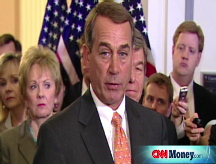Accord on rescue plan
Officials cite 'great progress' in talks over $700B financial bailout - see deal later Sunday.
NEW YORK (CNNMoney.com) -- Congressional leaders said shortly after midnight that they had reached a tentative deal over the White House's proposed $700 billion bailout of the financial system.
Members of both parties and Treasury Secretary Henry Paulson were aiming to craft final legislation by Sunday evening - in time for the start of financial markets around the world.
"We've been working very hard on this and we've made great progress toward a deal that will work and will be effective in the marketplace and effective for all Americans," Paulson said.
Paulson made the announcement along with House Speaker Nancy Pelosi, D-Calif., Senate Majority Leader Harry Reid, D-Nev., and other legislators. They characterized the accord as an agreement in principle.
"Now it's got to be turned over to the lawyers, turned into final language," said Sen. Kent Conrad, D-N.D.
The Bush administration, in the government's boldest strike yet at the credit crisis, is seeking congressional authority for Treasury to buy as much as $700 billion in troubled mortgage and other assets weighing down banks and other financial institutions. The goal is to free up banks to start lending again.
Under the tentative deal being finalized, the rescue program would be overseen by a board including the Treasury Secretary, Secretary of Commerce, head of the Securities and Exchange Commission and chairman of the Federal Reserve, said Conrad, who heads the Senate Budget Committee.
According to Conrad, $700 billion would be disbursed in stages, with $250 billion made available immediately. In addition, Treasury would establish an insurance program - with premiums paid by the industry - to mitigate taxpayer losses. The bill would also likely include some curbs on the compensation of executives at companies that participate.
Finally, the government would get the right to receive equity stakes in the companies that sell its assets. The measure is an attempt to reduce fiscal risk to taxpayers.
While "great progress" has been made and observers remain cautiously optimistic that a deal will get done Sunday, negotiators still have to sell the proposal to their respective caucuses.
Blue Dog Democrats, who insist the plan be paid for in a way that will not raise the deficit, and conservative House Republicans, who have pushed for Wall Street - not taxpayers - to pay for the plan, are likely to be the hardest votes to get.
The marathon negotiations on Saturday culminated several chaotic - and at times politically divisive - days on Capitol Hill as lawmakers and administration officials tried to quickly find common ground on a complicated proposal.
"This evening has been extremely difficult," said Reid. "We've had a number of calls with the White House and others."
Late Saturday night, one lawmaker in the talks said that the participants called Warren Buffett to get the famous investor's help in gauging potential market reaction.
Treasury Secretary Henry Paulson first announced the bailout plan on Sept. 18.
If enacted it would be the most dramatic and extensive government intervention in the economy since the Great Depression. President Bush on Wednesday gave a prime-time address in which he urged lawmakers to pass his plan and warned that the "entire economy is in danger."
The aim of the rescue is to unfreeze the credit markets - short-term lending among banks and corporations - by giving Treasury authority to purchase bad assets from banks and other financial institutions.
The core of the problem is bad real estate loans that have led to record foreclosures when the housing bubble burst and home prices declined.
In the past two weeks, the banking world and Wall Street have been reordered by a wave of collapses and corporate mergers. The most recent development was the seizure by federal regulators on Thursday night of Washington Mutual, once the nation's largest thrift and a major mortgage lender.
The chill of the credit freeze has been felt far beyond Wall Street, as well. Businesses large and small have seen the cost of borrowing spike higher.
At the same time, the scale of the administration's plan - and the quick pace of the debate over it - has given pause to many Americans and lawmakers worried about its potential cost to taxpayers.
"We begin with a very important task, a task to stabilize the markets, to protect all Americans - and do it in a way that protects the taxpayer to the maximum extent possible," Paulson said early Sunday morning.
In recent days, a group of House Republicans pushed back even as the lead congressional negotiators - led by Rep. Barney Frank, D-Mass., and Sen. Christopher Dodd, D-Conn. - said they felt they were close to a bicameral agreement.
On Thursday, House Republicans called for the government to insure financial institutions' mortgage-backed securities and for those institutions to fund the insurance through premiums. They said they want Wall Street to pay for its mistakes in a "workout" - not a bailout by taxpayers.
"House Republicans were very concerned this week that we do everything we could to bring both free market principles and protections for taxpayers to the table," said Rep. Roy Blunt, R-Mo.
Blunt said he would discuss the tentative deal with his colleagues and study the final wording when it is prepared but was hopeful that a final announcement was near.
"These are difficult issues and everybody showed lots of patience," Blunt said.
CNN's Alona Rivord, Kate Bolduan and Ed Henry contributed to this report. ![]()





